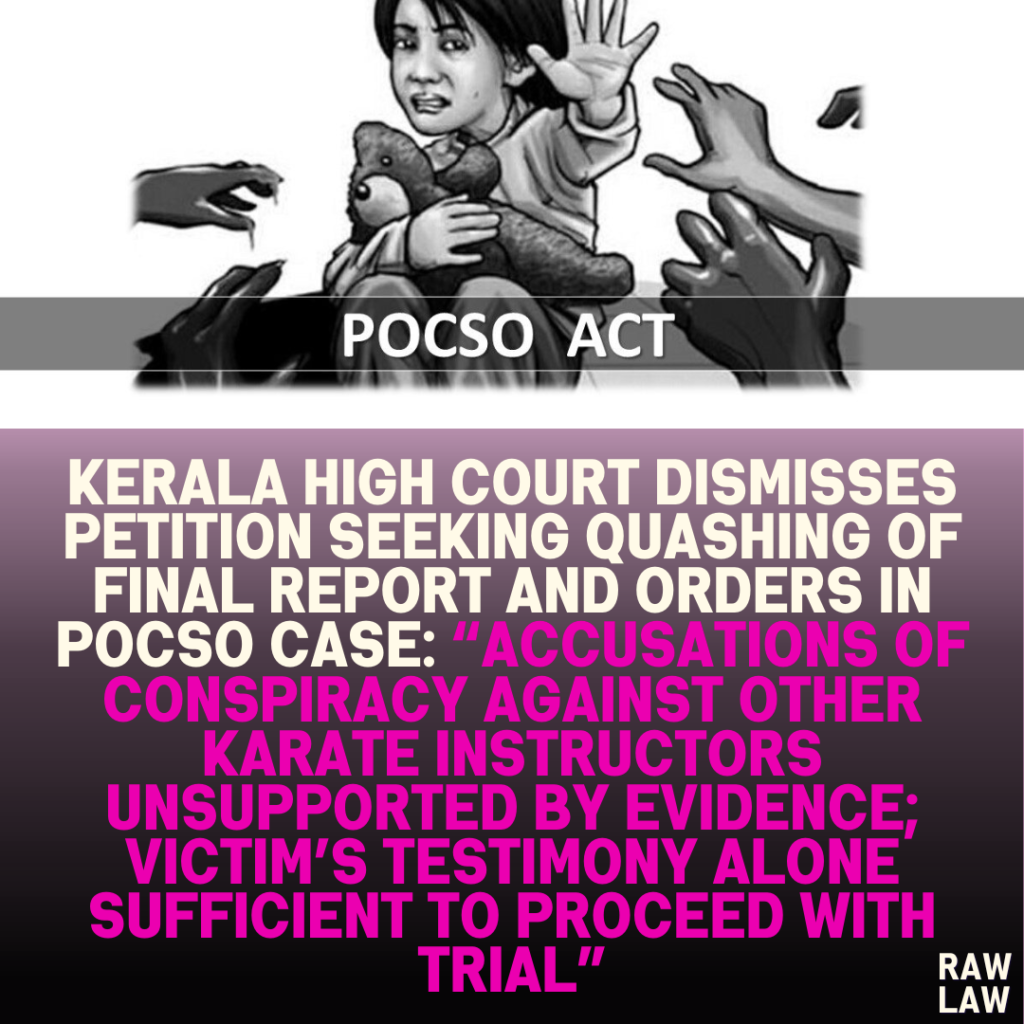Court’s Decision
The Kerala High Court dismissed the writ petition filed by the petitioner, who is the sole accused in Crime No.35/2024 of Cusba Police Station, Kozhikode. The petitioner sought for quashing the final report and also prayed for a re-investigation of the matter, alleging biased investigation and a false implication. The court found that the investigation conducted was fair, and the prosecution case relied solely on the victim’s statements, which provided enough evidence to proceed with the trial. The court held that the petition was filed to unnecessarily stall the trial and thus must be dismissed.
Facts of the Case
The petitioner is a Karate instructor and the accused in Crime No.35/2024 of Cusba Police Station, Kozhikode, which was initially registered by the Medical College Police Station, Thiruvananthapuram City. He is charged with offenses under Sections 354A(1)(i), 354A(2), 342, and 509 of the Indian Penal Code, along with Sections 7, 8, and 10 r/w Section 9(p) of the Protection of Children from Sexual Offences Act (POCSO Act) and Sections 3(2)(va) and 3(1)(w)(i) of the Scheduled Caste/Scheduled Tribe (Prevention of Atrocities) Act, 1989. The allegations stem from an incident on November 11, 2023, when the victim, a minor girl and a member of the Scheduled Caste community, was allegedly sexually harassed by the petitioner during a Karate championship in Kozhikode. The petitioner allegedly took the victim to a room, locked it, and kissed her repeatedly with sexual intent. The victim did not immediately report the incident due to mental strain but later disclosed it to her family and Karate master.
Issues
- Whether the investigation conducted was fair and impartial?
- Whether the allegations of conspiracy and false implication raised by the petitioner have any merit?
- Should the final report be quashed and a re-investigation ordered?
Petitioner’s Arguments
- The petitioner argued that the allegations were part of a conspiracy hatched by other Karate instructors who were in inimical terms with him.
- He contended that the victim had a relationship with another student and, when he warned them against it, this difference of opinion was used against him to falsely implicate him.
- He stated that there were continuous chats between him and the victim, which were handed over to the Cyber Police, but were conveniently disregarded by the investigating officers.
- The petitioner emphasized that the investigation was not conducted properly and a fair trial can only be ensured if a fair investigation is carried out.
- He argued that the police did not record the statements of any occurrence witnesses, and the investigation was conducted in a biased manner.
Respondent’s Arguments
- The Public Prosecutor argued that the allegations of sexual assault were recorded without delay and corroborated by the victim’s statements during the investigation.
- It was contended that the case is based on the victim’s testimony, and the attempt of the petitioner is merely to stall the trial proceedings.
- The prosecution maintained that the investigation was conducted properly, and there is no evidence to support the petitioner’s claims of a conspiracy or false implication.
Analysis of the Law
The court relied on the established principles that fair investigation is a crucial part of a fair trial and that false implication should be supported by tangible evidence. The court considered the victim’s statements made during the investigation under Section 161 Cr.P.C. and the final report, which were consistent in detailing the incidents of sexual harassment. The court also noted that the offenses alleged were serious, and a fair trial would ensure justice is served. The petitioner’s contentions of conspiracy and false implication were not substantiated by any evidence.
Precedent Analysis
The court did not specifically reference any previous judgments in its analysis but emphasized the general principles of fair investigation and the victim’s right to have her complaint properly investigated. The court’s reasoning aligned with established jurisprudence on the validity of a victim’s statement as key evidence in cases of sexual offenses.
Court’s Reasoning
The court reasoned that since the act of molestation occurred inside a room where only the petitioner and the victim were present, there was no requirement for the presence of occurrence witnesses. The victim’s testimony alone, corroborated by her statements under Section 164 Cr.P.C., provided enough grounds to believe in the veracity of her claims. The court found that the investigation did not suffer from any legal infirmities and was not biased in nature. The petitioner’s claims of a conspiracy were found to be contradictory and lacking substance.
Conclusion
The court concluded that the writ petition filed by the petitioner was without merit and aimed at stalling the trial proceedings. It held that the final report was filed after a thorough investigation, and there was no necessity for further investigation as sought by the petitioner. Therefore, the petition was dismissed.
Implications
The dismissal of the petition affirms the importance of victim testimonies in cases involving sexual offenses and emphasizes that mere allegations of bias or conspiracy without substantial evidence cannot be grounds to quash the final report or order a re-investigation. The ruling also underscores the principle that a fair trial can only be ensured if the investigation is conducted impartially and upholds the rights of the victim as well as the accused.



